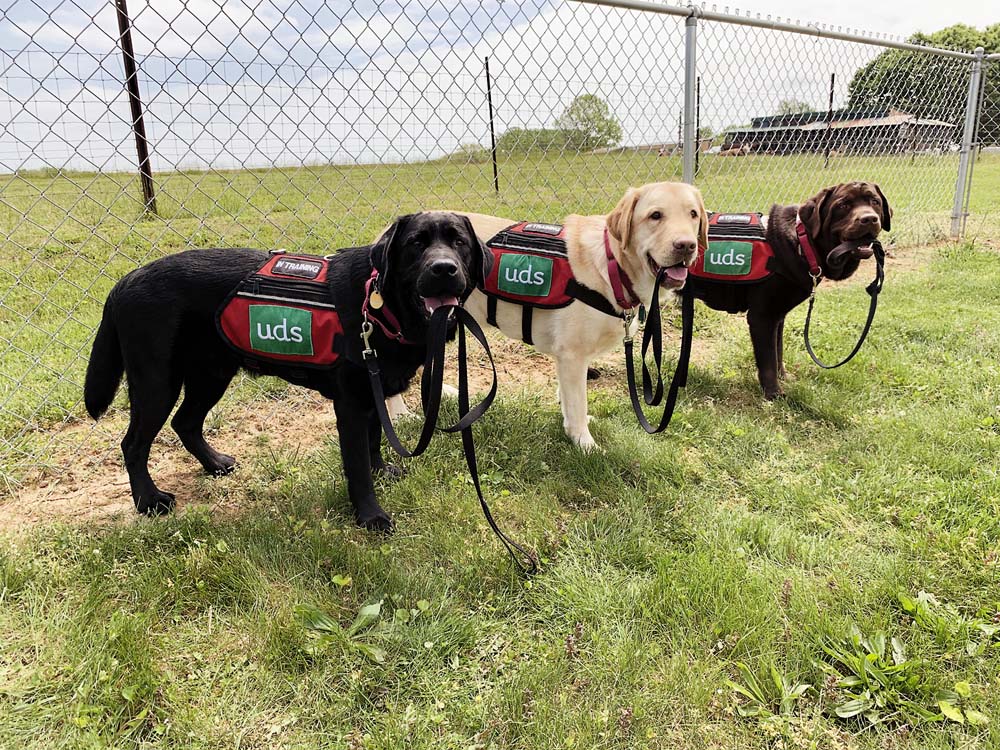
What is a Service Dog?
A service dog is a special ‘breed’ when it comes to providing assistance to children with disabilities. These specially trained canines learn specific commands targeted toward a child’s particular disability to assist them with their needs. For example, service dogs are trained to guide a blind child, demonstrate alerts of oncoming health episodes relating to diabetes and seizures, warn of safety concerns for the hearing impaired and children with autism, perform assistance to children with cerebral palsy, and tasks relating to other disabilities that require support and intervention.
As service dogs can be confused with emotional support dogs, it’s important to understand the difference. Emotional support dogs are used for companionship and general palliative care to help ease the symptoms of anxiety, depression, and certain phobias. Because the ADA defines service dogs as “dogs that are individually (and specifically) trained to do work or perform tasks for people with disabilities”, dogs that simply provide emotional comfort do not qualify as service animals.
Unlike emotional support dogs, service dogs have full public access rights and can go into places where other animals aren’t allowed.
How Children with Disabilities Benefit from Service Dogs
While each child has unique needs to support their disability, having a service dog can positively improve a child’s social skills, increase physical health, and provide medical assistance. Some of the trained tasks and benefits of having a service dog for a child with disabilities include improving social skills, better overall health and emotional well-being, and assisting in medical care.
Improved Social Skills:
- Children with autism and extreme anxiety often have difficulty in social situations. A service dog at a child’s side can initiate and develop conversations with others and improve active engagement.
- Children with developmental disabilities, autism, and brain trauma may struggle with speech and linguistic ability. Because people may be more likely to ask questions about the dog it provides an opportunity to develop language and speech skills.
- Children with autism, anxiety, and/or depression often struggle with feelings of isolation and separation from others. Service dogs can help a child feel more confident and included when interacting with others while also maintaining personal boundaries.
- Children in wheelchairs or other assistive devices can feel insecure and unstable when in public situations. Having a dog in a child’s presence can provide a sense of safety and security to help them navigate the social environment.
Better Overall Physical Health:
- Children with spina bifida, cerebral palsy, Down’s syndrome, and other disabilities that may limit a child’s motivation to exercise can benefit from service dogs as these canines provide an outlet for physical activity with regular walks/outings.
- For children with amputations, muscular dystrophy, or other disabilities that require a child to wear braces or other devices that impact their ability to walk or move steadily, service dogs can help with balance and control during active movement.
- A child with fine motor skill disabilities such as Down’s syndrome, brain injuries, spina bifida, can be a participant in a service dog’s care by actively brushing its coat, increasing upper body movements and coordination.
- A service dog can help children with such conditions as ADHD release hyperactive energy with active engagement and play with the animal.
Enhanced Emotional Well-being:
- Caring for a dog helps a child with virtually any disabilities – from autism to cerebral palsy to debilitating anxiety – establish consistent routines that contribute to self-confidence and purpose.
- Additional comfort of a dog can help a child with such conditions as a chronic sleep disorder, autism, and Down’s syndrome, to fall asleep or snuggle with their fur buddy if they have trouble falling back to sleep.
- Purposeful task-trained pressure from the dog (ex: placing a paw on a child’s leg) can provide a calming sensory distraction for a child with autism, behavioral outburst, or sensory processing disorders.
Assisting Medical Conditions:
- Service dogs are an invaluable support to guide and direct children who are blind or seeing impaired.
- Children with hearing impairments can be alerted to common sounds such as a telephone or alarm ringing by the service dog making physical contact with a nudge or paw placement.
- Service dogs can be trained to be a medical alert for a child who is having a seizure or diabetic episode and bring them to a safe spot.
- Specially trained dogs can assist in finding children with autism, Down’s syndrome, or those who may wander away unsupervised.
- Service dogs can provide safety measures by sniffing out and alerting to allergy-inducing foods that can trigger a reaction in children with life-threatening allergies.
- Service dogs can retrieve items for children with cerebral palsy, spina bifida, or those challenged with mobility.
Service Dogs Help Children with Disabilities Navigate Different Environments
Service dogs allow children with disabilities the opportunity to navigate and adapt to new environments with ease and comfort they might not experience without their guidance and support. The skills of a service dog can help a child with turning on lights, pulling doors, pushing wheelchairs, and assisting with tasks that a child has difficulty completing on their own.
Where Can Children with Disabilities Bring Service Dogs?
According to the Americans with Disabilities Act (ADA), service dogs that meet the ADA definition are legally permitted to accompany their handlers to any place open to the public including stores, restaurants, airports, buses, and schools. This extends to the Fair Housing Act, requiring that service animals must be allowed to live with their handlers, regardless of pet policies. Exemptions to the ADA regulations are private clubs and places of worship, which have discretionary rights to their policies regarding service animals and entry.
Expected Behavior of Service Dogs
While allergies and fears of dogs are not acceptable reasons for denying access or refusing admission to an individual with service animals, handlers must ensure that the animal is under control and well groomed. Service dogs are carefully vetted and trained to demonstrate behaviors expected of a service dog. They should exhibit above-average manners, and outstanding obedience skills that are apparent to an observer. These well-trained dogs understand commands and are responsive to direction. Such careful measures ensure that a family can feel confident their service dog is well-behaved in public settings.
Find out more
The experienced staff at UDS specializes in matching service dogs that fit each person’s unique needs. To find out more, visit UDS Service Dogs and explore the service dog programs and services for people with disabilities.
Contact UDS
If you feel you may qualify for a service dog, or want more information about service dogs, contact us and fill out your information to learn more about UDS’ services.
The UDS team is one of the leading human service providers in Pennsylvania. If you’re in Lancaster, PA, or counties surrounding the South Central PA areas, we are here to help you!
